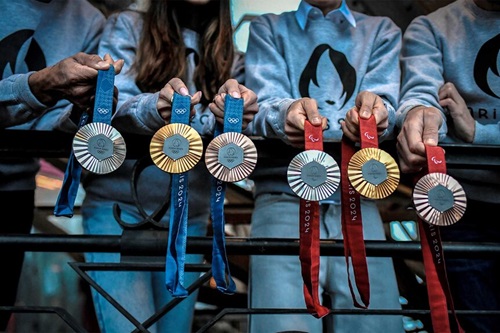
See how much athletes will receive for winning medals at the 2024 Paris Olympics
As the 2024 Paris Olympics progress, athletes from around the globe are not only vying for medals but also eyeing substantial rewards for their achievements.
While the International Olympic Committee (IOC) does not provide financial incentives for medalists, various countries have established their own bonus systems.
This year, World Athletics has made a historic move by announcing prize money for track and field athletes, adding an extra layer of excitement for Ghanaian competitors.
World Athletics, the governing body for track and field, declared in April that it will award $50,000 to gold medalists in all 48 track and field events in Paris. This initiative marks the first time an international federation is offering prize money at the Olympics. For the 2028 Los Angeles Olympics, this incentive will extend to silver and bronze medalists as well.
Ghana has not yet disclosed a specific reward package for its eight athletes competing in Paris. However, past instances provide a glimpse into the kind of support Ghanaian athletes can expect.
For example, Samuel Takyi, who secured Ghana’s only medal in boxing at the Tokyo Games, received a cash reward of $10,000, a Nissan Sunny saloon car also valued at $20,000, and an additional $20,000 career development fund. Each member of Ghana’s 14-athlete contingent in Tokyo was also awarded $5,000 (including Takyi) for their efforts.
Globally, some countries are offering significant financial incentives to their athletes:
![]()
- Hong Kong: Athletes will receive HK$6 million ($768,000) for a gold medal, HK$3 million for silver, and HK$1.5 million for bronze. The city has already seen early successes in swimming and fencing.
- Singapore: Offers SG$1 million ($745,300) for gold, SG$500,000 for silver, and SG$250,000 for bronze. Joseph Schooling, who won gold in the 2016 Rio Olympics, remains the sole recipient of the top cash bonus.
- Israel: Reportedly offering a million Israeli shekels ($270,537) for a gold medal, marking a 50% increase from the Tokyo Games.
- Malaysia: Provides one million ringgit ($215,563) for individual gold medalists, 300,000 ringgit for silver, and 100,000 ringgit for bronze. Some private companies offer additional incentives like luxury-serviced apartments or cars.
- Kazakhstan: Athletes can earn $250,000 for a gold medal, $150,000 for silver, and $75,000 for bronze. The state also awards apartments to medalists.
- South Korea: Offers 63 million Korean won ($43,288) for gold, 35 million won for silver, and 25 million won for bronze. Gold medalists also have the option of a lifelong monthly pension or a lump sum payment.
- France: The host country has increased its incentives, with gold medalists receiving 80,000 euros ($86,528).
- Germany: The Sports Aid Foundation provides cash prizes up to eighth place, with gold medalists receiving 20,000 euros ($22,000).
- India: Offers monetary rewards from both the government and its national sports body, with gold medalists receiving up to 17.5 million rupees ($210,000).
In addition to or in lieu of cash, some athletes receive other unique rewards. In Malaysia, Olympic athletes may get lifetime free food and teh tarik, a popular milk tea beverage. South Korea provides pensions and additional lump sum payments, while Kazakh athletes might receive apartments. Polish athletes receive paintings, holiday vouchers, scholarships, and even diamonds.
As Ghanaian athletes compete in the Paris Olympics, the hope is that they will secure medals and benefit from these generous rewards.
With high expectations and substantial incentives, the 2024 Paris Olympics promise to be a landmark event for athletes worldwide, including those from Ghana.
